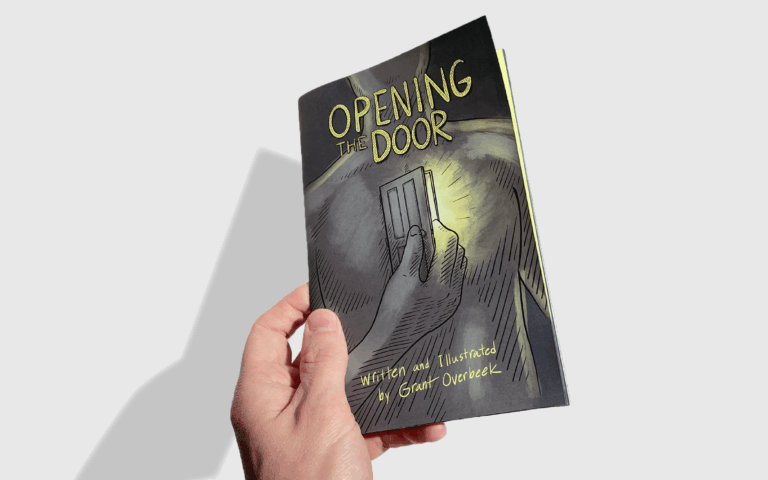This is the last in a 4-part series explaining why Equip uses “gay” and “gay Christian.” Check out Part 3: Weaker Siblings here. In this post, we will consider the heavy burdens of gay people for generations and how that awareness should inform ministry efforts. For a condensed version of this series, check out Pieter’s recent article on the topic in Juicy Ecumenism.
While recognizing Paul’s call to accommodate my weaker brothers by not using the phrase gay Christian, I must also consider what heavy burdens gay people carry. In Luke 11: 37-53, Jesus offers wisdom about these heavy burdens:
37 When Jesus had finished speaking, a Pharisee invited him to eat with him; so he went in and reclined at the table. 38 But the Pharisee was surprised when he noticed that Jesus did not first wash before the meal.
39 Then the Lord said to him, “Now then, you Pharisees clean the outside of the cup and dish, but inside you are full of greed and wickedness. 40 You foolish people! Did not the one who made the outside make the inside also? 41 But now as for what is inside you—be generous to the poor, and everything will be clean for you.
42 “Woe to you Pharisees, because you give God a tenth of your mint, rue and all other kinds of garden herbs, but you neglect justice and the love of God. You should have practiced the latter without leaving the former undone.
43 “Woe to you Pharisees, because you love the most important seats in the synagogues and respectful greetings in the marketplaces.
44 “Woe to you, because you are like unmarked graves, which people walk over without knowing it.”
45 One of the experts in the law answered him, “Teacher, when you say these things, you insult us also.”
46 Jesus replied, “And you experts in the law, woe to you, because you load people down with burdens they can hardly carry, and you yourselves will not lift one finger to help them.
47 “Woe to you, because you build tombs for the prophets, and it was your ancestors who killed them. 48 So you testify that you approve of what your ancestors did; they killed the prophets, and you build their tombs. 49 Because of this, God in his wisdom said, ‘I will send them prophets and apostles, some of whom they will kill and others they will persecute.’50 Therefore this generation will be held responsible for the blood of all the prophets that has been shed since the beginning of the world, 51 from the blood of Abel to the blood of Zechariah, who was killed between the altar and the sanctuary. Yes, I tell you, this generation will be held responsible for it all.
52 “Woe to you experts in the law, because you have taken away the key to knowledge. You yourselves have not entered, and you have hindered those who were entering.”
53 When Jesus went outside, the Pharisees and the teachers of the law began to oppose him fiercely and to besiege him with questions, 54 waiting to catch him in something he might say.
Jesus joins the Pharisees for dinner but chooses not to engage in the ritual washing before the meal. The Pharisees are surprised enough for the author to note their concern and for Jesus to respond.
He urges the Pharisees to show more concern for the inside of their bodies (their souls) instead of obsessively washing the outside of their bodies. Jesus accuses the Pharisees of not being generous to the poor and being too distracted by practicing ritual laws to address injustice. He accuses them of enjoying the highest seats of power and respect but bringing destruction to their community through their pride.
Jesus continues by accusing the Pharisees of adding so many new laws to the covenant that the burden of following the laws has become too heavy. These heavy burdens have kept people away from the love and knowledge of God. The legalism of the Pharisees has made it difficult for people to accurately perceive or experience God’s love. Moreover, the Pharisees are unwilling to take practical steps to address the suffering of these same people.
He accuses the Pharisees of selectively using the stories and images of prophets when convenient but then hypocritically approving of the murder of these same prophets.
Jesus warns the Pharisees that they will be punished for persecuting innocent men serving God. He concludes that not only have the Pharisees misled themselves, but also their legalism and hypocrisy have blocked others from knowing God.
The gospel author reports that after being challenged the Pharisees , instead of allowing Christ’s wisdom to convict and reform them, only questioned him more fiercely, picking apart his every word and “waiting to catch him in something he might say.”
The heavy burdens of gay people
Similarly, previous generations of gay people were given heavy burdens too great to bear, leading many to lose their faith. Presently, we risk hindering future generations of gay people from knowing Jesus in the same ways. Instead, we must commit to a strategy of ministry that will most effectively hand to gay teens the key to the knowledge of God’s love.
In the mid-20th century Freudian psychoanalysts popularized the notion of being gay as a mental disorder. From this pseudo-science grew conversion therapies and reparative therapies that promised to change an individual’s sexual orientation by addressing psychological wounds.
Christian ministries then combined the pseudo-science of Freudian psychoanalysts with charismatic elements, promising to make gay Christians straight if they prayed hard enough. At first promoting ex-gay terminology, reparative therapists later developed the language of same-sex attraction as part of their sexual conversion process. If a person failed to become straight, they were shamed for resisting the work of the Holy Spirit. Then while churches continued to hold gay people to a traditional sexual ethic, they abandoned historical biblical teachings about procreation, celibacy, divorce, and remarriage for straight people.
Studies have consistently shown that despite intense effort, a person’s attractions are unlikely to change. Limited but high-quality research demonstrates that only 3-4% of people who participated in sexual orientation change efforts experienced any change in their same-sex attractions, and even these results were from self-reports that cannot be verified. Moreover, scientific studies have demonstrated that sexual orientation changes efforts increase the risk of suicide attempts by an alarming 92%.
Other results of these practices are more substantial. In the most extensive study of LGBT+ people and the Church, Andrew Marin’s Us Versus Us reveals that of the 22.4 million LGBT+ people in the US, 19.3 million (86%) grew up in church. Perhaps surprisingly, LGBT+ people are actually more likely than the average American to grow up in a religious family. Of those, 10.4 million LGBT+ people have left the faith—that’s 54% of LGBT+ people who grew up in the Church—and their top reasons for leaving included negative personal experiences such as ex-gay programs.
Generations of gay people have been burdened by the Church with a false promise of change using the language same-sex attraction. When older generations of gay people hear a Christian using the phrase same-sex attraction, they assume that the Christian seeks to offer these same destructive ex-gay practices and are hindered from seeing or experiencing the love of God.
For some, same-sex attraction carried baggage that contradicts the love of Jesus. For younger generations, this phrase carries the same baggage at worst or is out of touch at best.
Unfortunately, studies show that gay teens today are at great risk. Gay teens are 5 times more likely to attempt suicide than their peers. LGBT+ youth who say religion is important to them are 38% more likely to be suicidal than their non-religious LGBT+ peers, suggesting that homophobic religious beliefs increase teens’ vulnerability to depression. This is staggering, particularly when we notice that religiosity reduces suicidality for every other demographic in the United States except for LGBT+ people. Gay teens who come from highly rejecting families are 8.4 times more likely to attempt suicide than other gay teens. We cannot undo the harm to gay people in the past, but we can prevent future loss of faith and life in gay teens by adopting more effective strategies, including using language that is most likely to reach the kids in our church pews.
In particular, we must eliminate the (on average) 5-year gap between when gay teens recognize their same-sex attractions versus when they share with a parent or pastor, left to make sense of their sexuality alone with the lies of culture and the Enemy. This leads to loneliness, anxiety, shame, depression, sexual sin, addiction, suicidality, and loss of faith. Instead, we must talk to every child about God’s love and wisdom for gay people so that as soon as kids recognize same-sex attractions, they share with a parent or pastor because they have heard those parents and pastors demonstrate safety, in part, by using the terminology they are familiar with.
For these reasons, I use the word gay. If you ask an 8-year-old today what the word gay means, you will most consistently hear, “a boy who likes a boy” or “a girl who likes a girl.” Modern kids and teens do not assume anything about an individual’s theological beliefs or relationship choices when using that word. But if instead I exclusively use same-sex attraction and forbid teens from using the language of their peers, I risk setting up a false dichotomy that they can either recognize their same-sex attractions or be a Christian. If I force gay teens to use terms that no one in their generation uses, instead of using language that is definitionally neutral, I will be less effective.
This attention to strategy is not foreign to the Christian. In 1 Corinthians 9:20-22 Paul says the following:
20 To the Jews I became like a Jew, to win the Jews. To those under the law I became like one under the law (though I myself am not under the law), so as to win those under the law. 21 To those not having the law I became like one not having the law (though I am not free from God’s law but am under Christ’s law), so as to win those not having the law. 22 To the weak I became weak, to win the weak. I have become all things to all people so that by all possible means I might save some.
While Paul no longer lived according to Jewish Law, when he hoped to most effectively reach Jews, he became like a Jew. He followed their customs and used their language. In the same way, I mirror the language of gay teens and young adults so that I can most effectively reach them.
I’ve provided references throughout this series to the Anglican catechism and prayer book as examples of theological statements that can be found across denominations. The 24th Article of the 39 Articles of Religion establishing the Anglican Church says this:
Of Speaking in the Congregation in such a Tongue as the people understandeth. It is a thing plainly repugnant to the Word of God, and the custom of the Primitive Church to have public Prayer in the Church, or to minister the Sacraments, in a tongue not understanded of the people.
A core principle of the Anglican Church has been to contextualize the gospel for each culture, instead of letting language and culture be a barrier to Christ’s love. We have committed to using terminology that will be readily understood by our audience. I mirror the language of gay teens and young adults so that I can most effectively reach them.
Weaker brothers vs. heavy burdens
After considering the call to accommodate my weaker brothers by not using the phrase gay Christian and the heavy burdens of gay people, it seems clear that the heavy burdens of gay teens outweighs the scandal of weaker brothers.
Like the hypocrisy of the Pharisees in Luke 11, Christians have inconsistently applied God’s wisdom for sexual stewardship. Churches have held gay people to a traditional sexual ethic while abandoning historical biblical teachings about celibacy, openness to children in marriage, divorce, and remarriage for straight people. Simultaneously, Christians have perpetrated destructive sexual orientation change efforts in their own churches, leading to 54% of gay Christians losing their faith. Even today, Christian leaders follow the example of the Pharisees of Luke 11 by selectively lifting up the voices of gay celibate Christians when it furthers their agenda, but they refuse to condemn the reparative therapy and conversion therapy practiced in our churches.
Despite these challenges, some gay Christians have continued to steward our sexualities according to a historic sexual ethic. Yet we have struggled to thrive in our churches where this discriminatory application of a historic sexual ethic continues, where pastors fail to teach clearly and compassionately about God’s love and wisdom for gay people, where silence forces gay teens to make sense of their sexuality alone, where pastoral care is outsourced to therapists and para-church ministries, and where celibate people fail to experience permanent, lived-in family—regardless of sexual orientation. Like the Pharisees of Luke 11, Christian leaders fail to take practical steps to alleviate these heavy burdens.
Instead, religious elites heap on the burden of additional language policing. Gay Christians have been given complex and inconsistent rules for what terminology can be used. Many have been cautioned against fellowshipping with other gay celibate Christians. Gay Christians have been discouraged from sharing their full testimony. Many have been barred from speaking and teaching unless they comply with this legalistic standard.
I fear these heavy burdens will make it difficult for gay Christians to believe that God exists and loves them because of their painful experience of the Body of Christ. I fear that gay people outside of conservative churches will see how gay celibate Christians are treated, and wonder, “If that’s how they treat the celibate ones, then I’m certainly not welcome,” hindering them from knowing God.
I pray that leaders across denominations would recognize the biblical orthodoxy of this strategy and join the missiological effort to help churches becomes places where gay people can thrive according to a traditional sexual ethic, including trusting gay people and their local family of God to discern the wisest ways to describe their sexualities.
Equip trains pastors and parents to teach God’s wisdom, including His designs for vocational singleness and Christian marriage. To begin this kind of work at your church, contact us today!







Don
Bravo! I’m sorry you even have to address this baloney.
Pieter Valk
Don, thanks for your encouragement. I too wish these topics didn’t have to be debated so endlessly, but alas.
Pieter Valk
You’re welcome!